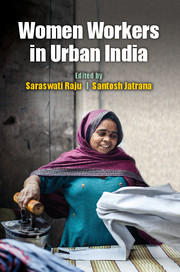Book contents
- Frontmatter
- Contents
- List of Figures
- List of Tables
- Preface
- 1 Setting the Backdrop
- 2 Women Workers in Urban India and the Cities
- 3 Gendered Vulnerabilities: Work-Life Trajectories of Female Domestic Workers in Jaipur
- 4 Occupational Domestication in a Post-Resettlement Context: An Analysis of Women's Work in Kannagi Nagar, Chennai
- 5 Old Jobs in New Forms: Women's Experiences in the Housekeeping Sector in Pune
- 6 Persistent Inequalities and Deepened Burden of Work? An Analysis of Women's Employment in Delhi
- 7 Spare Change for Spare Time? Homeworking Women in Banaras
- 8 Gender, Work and Space: Home-based Workers in Garment Industry in Kolkata
- 9 Labour Control and Responses: Women Workers in an Apparel Park in Kerala
- 10 New Urban Economic Spaces and the Gendered World of Work in Kolkata
- 11 Gender Equality and Women's Employment in the Banking Sector in India
- 12 Women Body Screeners and the Securitization of Space in Indian Cities
- Notes on Contributors
- Index
12 - Women Body Screeners and the Securitization of Space in Indian Cities
Published online by Cambridge University Press: 05 May 2016
- Frontmatter
- Contents
- List of Figures
- List of Tables
- Preface
- 1 Setting the Backdrop
- 2 Women Workers in Urban India and the Cities
- 3 Gendered Vulnerabilities: Work-Life Trajectories of Female Domestic Workers in Jaipur
- 4 Occupational Domestication in a Post-Resettlement Context: An Analysis of Women's Work in Kannagi Nagar, Chennai
- 5 Old Jobs in New Forms: Women's Experiences in the Housekeeping Sector in Pune
- 6 Persistent Inequalities and Deepened Burden of Work? An Analysis of Women's Employment in Delhi
- 7 Spare Change for Spare Time? Homeworking Women in Banaras
- 8 Gender, Work and Space: Home-based Workers in Garment Industry in Kolkata
- 9 Labour Control and Responses: Women Workers in an Apparel Park in Kerala
- 10 New Urban Economic Spaces and the Gendered World of Work in Kolkata
- 11 Gender Equality and Women's Employment in the Banking Sector in India
- 12 Women Body Screeners and the Securitization of Space in Indian Cities
- Notes on Contributors
- Index
Summary
Introduction
Cities are becoming increasingly securitized. As these spaces become targets of political attack by militant groups, they also become sites of highly organized manoeuvres by the state and private industries.
In India, there have been many such jarring acts of urban violence in urban spaces by militant groups. Especially since 2000, bombings have occurred in most major Indian cities, including Delhi, Bangalore, Hyderabad, and Mumbai. They take place at governmental buildings like the High Court, Parliament buildings, etc., and often in crowded markets, bus stands, commuter trains, cinemas, universities and hotels.
This comes at a time when governing bodies at local, regional, national and global levels have joined in anti-terror campaigns. There has been a growing international rhetoric of ‘security’ and policies like the ‘War on Terror’ from the US. Following this trend, Delhi police began waging a campaign called ‘Let's Fight Terror Together’ in December of 2001, after attacks on the Red Fort and Parliament (Mehmood 2008). Then in 2002, the Indian government passed POTA, the Prevention of Terrorism Act, on the heels of the US Patriot Act in 2001, a sweeping policy that legalized surveillance and other anti-terrorism measures in the US.
As a result, checkpoints have diffused throughout Indian cities, becoming normalized and integrated as features of urban spaces. These checkpoints constitute ‘architectures of security’, as Jones (2009) argues. Here, the movement of people through the entrances of buildings serves as a geography to regulate terrorism. Curiously, these checkpoints have also become a driving source of women's labour.
In this chapter, I describe how the growth of the security industry is pulling women into new jobs in Indian cities. Occupations in body screening at public and private checkpoints represent more than an emergent employment sector though. They reflect the changing nature of the city itself, which is reorganizing to accommodate militarisation, surveillance, and technology. They also reflect an emergent field of cybersecurity and how it is incorporating women globally. After outlining the details of these jobs, and what it means to be a security screener in India's expanding cities of Hyderabad, Delhi, and Gurgaon, I discuss the opportunities and challenges for women.
Theorizing cybersecurity, labour, and gender
Body scanning reflects a form of labour within the nascent industry of cybersecurity.
- Type
- Chapter
- Information
- Women Workers in Urban India , pp. 312 - 332Publisher: Cambridge University PressPrint publication year: 2016



